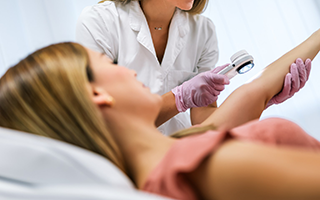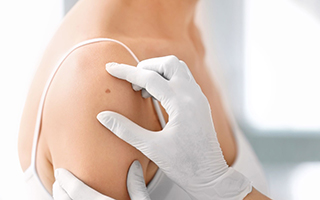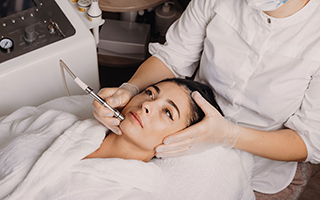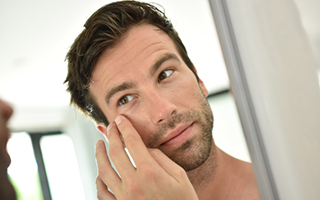Merkel Cell Carcinoma
Diagnosis and Treatment for a Rare Type of Skin Cancer in Bryn Mawr, Newtown Square, Philadelphia, and the Main Line
- Home
- Medical Dermatology
- SKIN CANCER
- Merkel Cell Carcinoma
Merkel cell carcinoma (MCC) often looks harmless and may be mistaken for other, less severe dermatological conditions—like an insect bite, sore, basal cell carcinoma, or cyst—but is actually an uncommon form of skin cancer that is aggressive and can be fatal if it isn’t treated quickly. This lesion is also referred to as a neuroendocrine carcinoma of the skin or trabecular cancer. It develops in the epidermis—the outer layer of skin—when Merkel cells (touch receptors) that are near nerve endings begin to grow abnormally due to exposure to ultraviolet radiation or induction by the polyomavirus. Patients can have suspicious spots checked for Merkel cell carcinoma at Bryn Mawr Skin & Cancer Institute, since correct diagnosis and early treatment are critical for saving lives.
Bryn Mawr Skin & Cancer Institute offers customized care and treatments for rare skin cancers like Merkel cell carcinoma. To schedule an appointment, Please BOOK ONLINE, call 610.525.5028, or Contact Us.
What Causes Merkel Cell Carcinoma?
The main risk factors for the development of this form of skin cancer are excessive sun exposure and having a weakened immune system. In 2008, the Merkel cell polyomavirus was discovered and found to be frequently present in Merkel cell carcinoma tumors, suggesting that it is involved in the development of this cancer. Recent studies have validated the initial study, finding the polyomavirus in approximately 80 percent of Merkel cell carcinomas. Studies show that the majority of people have been exposed to the polyomavirus by adulthood, but it appears that the virus does not cause problems except in the very rare situations in which it leads to Merkel cell carcinoma.
What Are the Symptoms of Merkel Cell Carcinoma?
Merkel cell carcinoma tends to appear on areas of the skin that are frequently exposed to the sun, such as the face, head, neck, trunk, hands, arms, and legs. It presents as a painless, flesh-colored, reddish, or purple lump that feels firm to the touch. This rare form of cancer may spread to other areas of the skin and body, including the lymph nodes and internal organs, if it progresses.
What Are the Risk Factors for Merkel Cell Carcinoma?
Overexposure to natural sunlight, exposure to tanning beds or other sources of artificial sunlight, certain medications or diseases that weaken the immune system, having a history of cancer, being older than 50, being Caucasian or having light-colored skin, and being a male are all factors that may increase the risk of developing this rare cancer. As noted above, studies suggest that Merkel cell carcinoma may be linked to having the Merkel cell polyomavirus.
What Can Be Done to Treat Merkel Cell Carcinoma?
Several types of procedures and tests are used to determine whether a patient has Merkel cell carcinoma, including a physical exam, full-body skin exam, and skin biopsy.
The most suitable treatment options will depend on several factors, including the stage of the cancer, where it’s located, whether the cancer has recurred, the age of the patient, and the state of health of the patient. Mohs surgery—which focuses on removing and scrutinizing the tumor and adjacent tissue—or surgery to remove the tumor, surrounding skin, and lymph nodes, are the two most common methods used for treating Merkel cell carcinoma. Radiation therapy, immunotherapy, or chemotherapy may also be needed.

Meet Our Dermatologists &
Certified Physician Assistants
Our board-certified dermatologists & PA-Cs are dedicated to detecting and treating skin cancers. We treat the full spectrum of skin diseases. Our Mohs and Plastic Surgery practices are integrated, and offer patients the most advanced skin cancer treatment, delivering superior outcomes.
How Can Merkel Cell Carcinoma Be Prevented?
The best way of preventing Merkel cell carcinoma is thought to be avoiding overexposure to ultraviolet radiation. Refrain from exposing yourself to sunlight when the rays are most intense—between 10 a.m. to 3 p.m.—wear ultraviolet protective clothing and accessories such as sunglasses and hats to keep your skin covered, apply an adequate amount of broad-spectrum SPF 50+ sunscreen and re-apply it every few hours when outdoors, and monitor your skin for any new spots or moles that are changing in size, shape, and color.
Patients on the Main Line in Bryn Mawr, Newtown Square, and Philadelphia can receive advanced treatment options for Merkel cell carcinoma from Bryn Mawr Skin & Cancer Institute. To schedule an appointment, Please BOOK ONLINE, call 610.525.5028, or Contact Us.

























